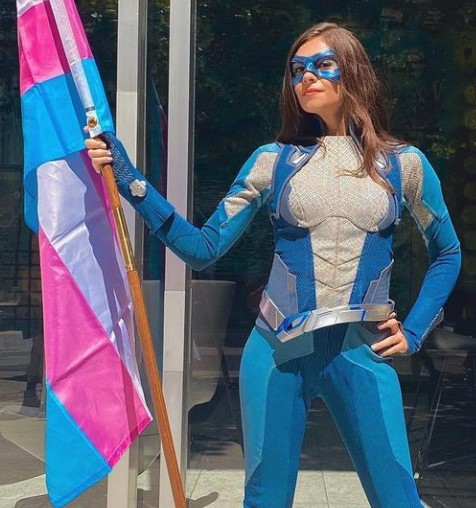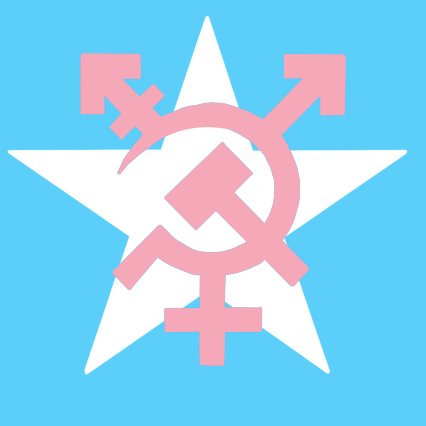Time for yet another essay on Transgender Marxism
This essay marks the halfway point!
The PDF is here - https://transreads.org/wp-content/uploads/2021/07/2021-07-15_60f0b3d5edcb7_jules-joanne-gleeson-transgender-marxism-1.pdf
The Intro Discussion with links to all previous essay discussions is here - https://lemmygrad.ml/post/395378
If you’re unsure what this post is: I’m leading a discussion group in real life on Intersectional Marxist Transfeminism, and I thought some of my comrades on the Internet may be interested in reading this essay collection as well.
This will be my initial read-through and note-taking. I hope to spark a discussion, or at least for us to learn something new together. So feel free to add comments and ask questions <3
Today’s essay is Queer Workerism Against Work: Strategising Transgender Labourers, Social Reproduction & Class Formation by Kate Doyle Griffiths.
Kate Doyle Griffiths is an anthropologist at City University of New York’s Graduate Center, a lecturer at Brooklyn College, and co-chair Red Bloom in New York City. Kate is an editor of Spectre. They are an ethnographer who writes about Southern Africa and the USA, workers, strikes, health and medicine, gender, Queers, race, class, Marxism and what is to be done.
Edit: the discussion continues with the next essay, by Farah Thompson, here - https://lemmygrad.ml/post/417377


“Our lives and experiences insert indeterminacy and uncertainty, both in the sense of compelling feminism to reckon with the possibility of actually existing non-binary forms of gender, made liveable through a combination of self-assertion and community recognition. But also by revealing that even binary genders are changeable across time, and an individual lifespan.”
“While there is not one single experience – and many individuals may experience some, none, or all of these features – queers collectively represent a concentrated group that tend to be alienated. Which is to say we are dispossessed not only as all proletarians are by definition, but also from the social means of reproduction and redistribution, which is to say from the family.”
"In historical accounts, like Chauncey’s Gay New York, or Feinberg’s historical novel Stone Butch Blues, we see how the rise of industrial urban environments attracted queer people to large cities. These migrating queers often found work in ports and warehouses, and as sex workers serving both working-class and wealthy urban clients. This work was taken up in part because these roles accommodated those whose presentations violated the gender norms of polite society. And because this work assumed or tolerated a certain laxity with respect to legal niceties."
“Gentrification and the financialisation of real-estate in most urban centres worldwide has now dispersed communities of dock and warehouse workers, remodelling what were once accommodations for transient sailors, and ‘cleaned up’ red light and gay districts.”
“it’s still true that queer social and sexual relations bring together individuals and groups among whom intimacy is prohibited or taboo in wider society – across hetero norms of sex and romance, but also across race, class, religion, educational experience, language, profession, and national origin.”
"This provides fertile ground for making unlikely connections. Queer sociality throws up opportunities for comradely relations that may otherwise seem unlikely, extending across the division of labour and social prohibition. The historical record includes many examples where this proves true, such as one wealthy industrialist, a trans man living in New York City, Reed Erikson. Styling himself as something of a twentiethcentury Engels, Erikson was of such means that his family yacht Granma, came to be owned by Fidel Castro"
“Less serendipitous perhaps but more typical was the role of queer people in the mass struggle against apartheid. In conditions where crossracial sociality outside formalised conditions of servitude was all but outlawed, those willing to break legal restrictions on queer relations were more often to be willing to break both apartheid bans, and informal norms against race-mixing”
This last section, of course, is the part that has stuff I’m actually enjoying reading
“Relationships across the juridical racial divide were outlawed along with homosexual relations, and ‘cross dressing’. So it’s not surprising then that many of the ‘underground’ organisers of the movement to overthrow this system were LGBTQ. A kind of outlaw solidarity appeared in the face of state racism. This formed a shared basis for significant political action, even if they largely remained closeted in the context of the struggle-era African National Congress, and then in its attendant union and social movement formations.”
“Simon Nkoli, writing to his covert lover from prison, where he had been detained for banned political activity with the United Democratic Front, wrote: ‘I have another idea about launching a new gay association when I get out of prison – maybe a progressive association’. Before Nkoli’s death he achieved this dream, playing an important role in winning the liberation movement over to active defence and affirmation of LGBTQ rights. Remarkably, these efforts were formally enshrined in the nation’s postapartheid constitution.”
“Zachie Achmat’s life history similarly demonstrates this tendency to organise across social divides, with him founding and joining a series of organisations. As a student organiser and member of the Marxist Workers Tendency, Achmat was imprisoned for anti-apartheid agitation. Later, in free South Africa, he launched the Treatment Action Campaign (TAC) – pushing back against the AIDS-denialist and medically austere policies of President Thabo Mbeki.”
“Transitional organisations build concrete solidarity across unions and sectors. But they also necessarily operate across the divides of race, nation, gender, sexuality, and other divisions within the working class.”
“The rank-and-file strategy assumes that development of consciousness – from trade union to class, and perhaps from class consciousness to a socialist one – is the project of socialists through the process of building concrete solidarity, within overlapping layers of organisation”